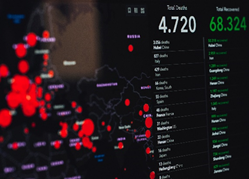
Humanity has experienced a number of devastating health crises throughout history - flu, cholera, plague, HIV/AIDS, and now the current COVID-19 pandemic. One can easily argue that COVID-19 has brought about a level of disruption that the modern world has never seen before. According to the Center for Systems Science and Engineering at Johns Hopkins University, there are nearly 9 million confirmed cases (Center for Systems Science and Engineering at Johns Hopkins University, 2020), and the number keeps growing on a daily basis.
As the virus continues to wreak havoc all over the world, it is becoming clear that poverty and a lack of resources is greatly impacting efforts to tackle this pandemic. “The coronavirus pandemic in Spain is taking a disproportionate toll on the poor, the elderly, the marginalised and those working in low-paid but vital jobs” (Burgen & Jones, 2020). To understand this argument, one must look at the guidelines given by several health organizations in order to stop the spread of the virus. Two of the main recommendations are “wash your hands” and “avoid close contact” (Centers for Disease Control and Prevention, 2020). For low-income countries and impoverished communities, these two guidelines that seem relatively easy to follow can be problematic.
In places where people live in extreme poverty, “the share of the world’s population living on less than $1.90 per day” (Mahler, Lakner, Aguilar, & Wu, 2020), access to soap and running water is not guaranteed, and oftentimes social distancing is not an option due to dense housing conditions. Dr. Natalia Linos, Executive Director of the François-Xavier Bagnoud Center for Health and Human Rights at Harvard University, explains that, “If you're telling people who live in slums that they need to wash their hands, but you don't have running water — they don't have soap — then you're really not doing something . . . the response isn't poverty sensitive. It's not understanding what the limitations are” (Rodriguez, 2020).
It is evident that to fight this virus and save human lives, the world needs to look after its most vulnerable groups, especially the poor and low-income members of society. In her article for Global Citizen, writer Leah Rodriguez mentions that “experts are urging the world to prepare to lend extra support to low-income countries to address this pandemic” (Rodriguez, 2020). Our collective humanity is tested during times of uncertainty. Will we rise to the challenge and come out of this crisis more “human” and stronger than ever before?
Dr. Mehdi Khosrow-Pour, Executive Director of the World Forgotten Children Foundation (WFCF), states in his recent blog post “The Unspoken Negative Impacts of COVID-19 on Non-Profit Organizations Worldwide” that “Knowing that the majority of assistance for different humanitarian causes around the world comes from the Western part of the world (specifically economically privileged countries) and that everyone has been wholly occupied with the COVID-19 pandemic, the result has been a very sharp decline of the level of assistance generated from the Western world to support all these individuals. This has left millions of people around the world on their own to deal with their horrible living conditions and many other challenges, all while they too are experiencing the impacts of COVID-19. These communities have a fraction of the resources available that more developed regions in the Western world have for dealing with the virus outbreak…Let us not forget that our commitment and support for those who are less fortunate should not be diminished during the COVID-19 health pandemic. The communities and individuals who can benefit from our assistance and compassion, need it now more than ever, and cannot wait until this health pandemic is over” (Khosrow-Pour, 2020).
Finding ways that you can become more actively involved and support these underprivileged communities is so important. For more than 15 years, the World Forgotten Children Foundation (WFCF), has been a pillar for serving children with cognitive and physical disabilities in developing countries. Now, through its expanded mission, WFCF is also carrying out initiatives that also fully serve the underprivileged communities they live in which includes ensuring that these communities have clean water for drinking and hygiene. By providing critical resources to these individuals we can help them better combat this virus and support them in this most devastating of times.
Learn more here about how you can get involved with the World Forgotten Children Foundation (WFCF).
Sources
Burgen, S., & Jones, S. (2020, April 1). Poor and vulnerable hardest hit by pandemic in Spain. Retrieved from The Guardian:https://www.theguardian.com/world/2020/apr/01/poor-and-vulnerable-hardest-hit-by-pandemic-in-spainn
Center for Systems Science and Engineering at Johns Hopkins University. (2020, June 21). COVID-19 Dashboard. Retrieved from Johns Hopkins University & Medicine Web site: https://coronavirus.jhu.edu/map.html
Centers for Disease Control and Prevention. (2020, June 21). Coronavirus Disease 2019 (COVID-19). Retrieved from Centers for Disease Control and Prevention: https://www.cdc.gov/coronavirus/2019-ncov/prevent-getting-sick/prevention.html
Khosrow-Pour, M. (2020, June 24). The Unspoken Negative Impacts of COVID-19 on Non-Profit Organizations Worldwide. Retrieved from the World Forgotten Children Foundation (WFCF) Web site: /blog/covid-19-negative-impacts-on-non-profit-organizations-worldwide/82
Mahler, D. G., Lakner, C., Aguilar, A. C., & Wu, H. (2020, April 2020). The impact of COVID-19 (Coronavirus) on global poverty: Why Sub-Saharan Africa might be the region hardest hit. Retrieved from World Bank Blogs: https://blogs.worldbank.org/opendata/impact-covid-19-coronavirus-global-poverty-why-sub-saharan-africa-might-be-region-hardest
Rodriguez, L. (2020, April 2020). 5 Reasons COVID-19 Will Impact the Fight to End Extreme Poverty. Retrieved from Global Citizen: https://www.globalcitizen.org/en/content/how-covid-19-impacts-fight-to-end-extreme-poverty/


